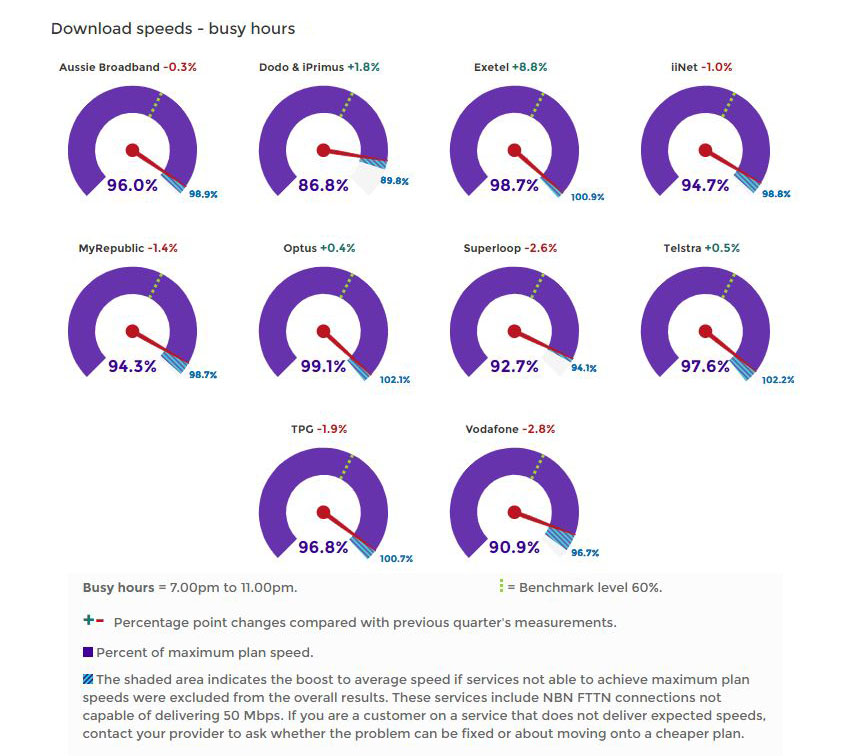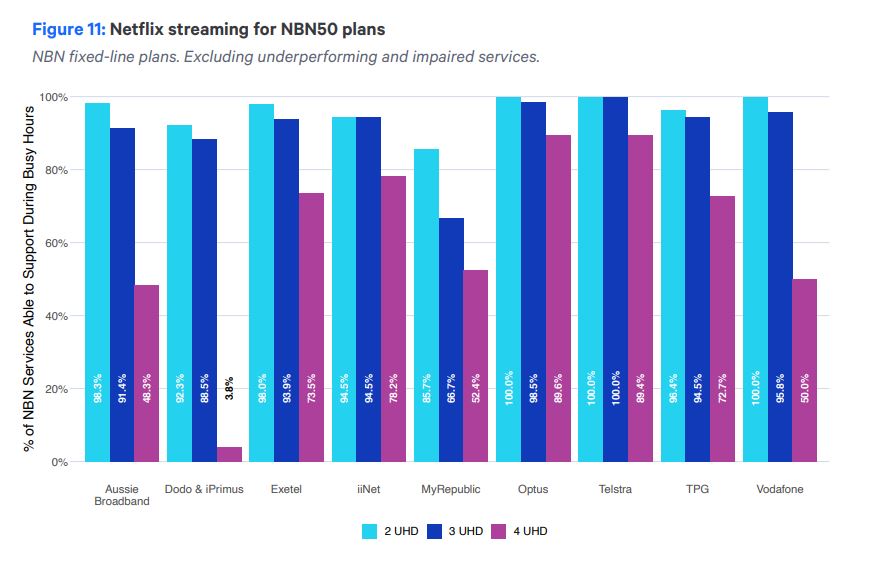The Australian Competition and Consumer Commission (ACCC) has dropped its latest Measuring Broadband Australia Report – and the good news is, NBN performance has never been better.
The 13th quarterly report tracked the speeds achieved by Australia’s leading NBN providers throughout February 2021, analysing both download and upload speeds during the peak traffic period between 7pm and 11pm. After losing out to TPG in March’s ACCC rankings, Optus is back on top, reclaiming the number-one spot it held consecutively from August 2019 through to this year.
Alongside Optus and TPG, the report measured speeds from nine other providers, including Telstra, Aussie Broadband, iiNet, Vodafone, MyRepublic, Dodo/iPrimus, Exetel and Superloop. In addition to recording download and upload speeds, the report also assessed video streaming during peak-hour periods to determine which providers are offering the most consistently strong NBN performance.
This quarter’s report is also the first in which the ACCC has included ‘very high speed’ plans on the NBN 1000 or Home Ultrafast speed tier. These speeds are currently only available to Australians on eligible FTTP or HFC connections, and results were presented in their own section separate from the standard download and upload speed data.
Fastest NBN download speeds
The ACCC performed 198,168 download speed tests on participating fixed-line NBN connections during the testing period, all conducted during the busy 7pm – 11pm evening period. Each test measures a connection’s speed as a percentage of the maximum possible speed achievable on that specific plan, with the average speed from each provider used to calculate overall results. The closer to 100% a provider scores, the faster their plans perform on average during peak traffic times.
After logging a score of 98.7% in last quarter’s report, Optus has regained its number-one spot, achieving an average download speed of 99.1% of the maximum. Previous winner TPG slipped to fourth place with 96.8% – a decrease of 1.9% when compared to the ACCC’s March data.
The full download speed results are:
- Optus: 99.1%
- Exetel: 98.7%
- Telstra: 97.6%
- TPG: 96.8%
- Aussie Broadband: 96.0%
- iiNet: 94.7%
- MyRepublic: 94.3%
- Superloop: 92.7%
- Vodafone: 90.9%
- Dodo & iPrimus: 86.8%
Second-placed provider Exetel showed the most improvement over the last three months, with a performance increase of 8.8% (98.7%, up from 89.9% in March). Telstra slipped into third place this quarter with 97.6%, while Aussie Broadband’s 96.0% placed it just behind TPG.
Overall, NBN performance continues to improve, with this quarter’s testing showing the fastest results since the report’s inception in 2018. The majority of tests achieved speeds of more than 90% of the maximum plan speed, and the performance gap between the biggest telcos and smaller providers continues to narrow.
“These latest results suggest the NBN is performing well and retail service providers are largely delivering what consumers expect and have paid for,” ACCC Commissioner Anna Brakey said.

If you’re interested in plans from this report’s included providers, we’ve listed several below. The following table shows a selection of published unlimited Standard Plus Evening Speed (NBN 50) plans from Canstar Blue’s database, listed in order of standard monthly cost, from the lowest to highest and then by data allowance, largest to smallest. Use our comparison tool to see plans from a range of other providers. This is a selection of products with links to a referral partner.
NBN 1000 speeds
In a new inclusion for the Measuring Broadband Australia report, the ACCC looked at the typical performance of connections on the Home Ultrafast NBN 1000 tier, which offers download speeds of up to 1000Mbps. The report found that most Ultrafast plans delivered an average speed of between 608Mbps and 745Mbps, but noted that busy-hour performance fell by around 23%.
33.5% of tests on Ultrafast plan achieved a download speed of at least 900Mbps, with the fastest speed customers can expect around 940Mbps. While these plans were certainly much faster than the more common NBN 100 and even NBN 250 tiers, the ACCC found them to be more susceptible to peak-hour congestion, with a much more pronounced drop in speed in the evening.
Fastest Netflix streaming speeds
The latest report also assessed how included providers handle video streaming during busy hours, recording how often each telco can deliver up to four ultra-HD Netflix streams simultaneously on a single connection. As with last quarter’s report, all four major speed tiers can theoretically support up to four HD streams at once, including the entry-level Basic or NBN 12 speed.
The ACCC found that NBN 25 plans could deliver at least one ultra-HD stream, with around 75% of connections able to support two simultaneously. Most NBN 50 plans can handle three simultaneous ultra-HD streams, while NBN 100 connections should be capable of five.
The below graph indicates how well each NBN provider was able to support ultra-HD streams on their respective NBN 50 speeds. Telstra, Optus and Vodafone were each able to support two ultra-HD streams in 100% of busy hour tests, with Telstra achieving a perfect score for three simultaneous streams.

Fastest NBN upload speeds
In addition to download speeds, the ACCC measured the average upload speeds achieved by providers during peak hours. One of the most consistently fast providers when it comes to uploads, Exetel performed at 89.1% on average, followed by Vodafone (86.6)% and MyRepublic (86.5%).
The full upload speed results are:
- Exetel: 89.1%
- Vodafone: 86.6%
- MyRepublic: 86.5%
- TPG: 85.7%
- Dodo & iPrimus: 84.5%
- Superloop: 84.2%
- Telstra: 84.2%
- Optus: 82.7%
- Aussie Broadband: 81.7%
- iiNet: 81.4%


Share this article